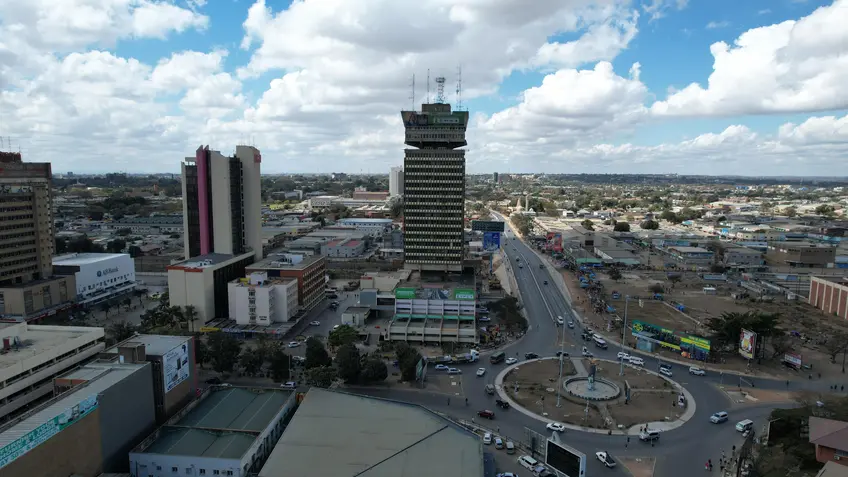The Strength of Partnerships: Zambia's Renewable Energy Initiative
"Lusaka, Zambia CBD Kafue Roundabout" by Lupali is licensed under CC BY-SA 4.0.
Despite minimal historical contributions to global greenhouse gas emissions, Zambia faces significant threats from climate change. In response, the country has established ambitious goals and commitments for resilient, low-carbon and sustainable development. One of the initiatives that showcases Zambia's bold vision and climate leadership is the Lusaka Renewable Energy Project —Chongwe Smart City, an initiative that aims to provide clean and affordable solar-generated electricity to a rural community near the capital city of Lusaka.
The project won The Best Urban Development NDC Initiative of the Year award at the Africa Investment Earthshot Leaders' Summit and NDC Investment Awards Ceremony at COP28. The special award ceremony was hosted to celebrate the best practices and achievements of African countries in advancing their NDCs and mobilizing investments for climate action. “This award is thanks to direct support from the NDC Partnership Support Unit, the United Nations Framework Convention on Climate Change (UNFCCC) and some of our partners from the private sector,” noted Mr. David Kaluba, the NDC in-country facilitator, during an interview on national television in Zambia.
By procuring 100 megawatts of solar energy at low cost through competitive tendering for the construction of grid-connected capacity, the Lusaka Renewable Energy Project stands to significantly benefit Zambia's economy and the environment. The initiative will also increase private-sector participation in line with the country's national development targets. The project, once realized, will introduce a significant and sustainable supply of solar-powered energy into the grid, thereby reducing the use of charcoal and lowering the rates of deforestation. The project will also create green jobs, enhance health services and education levels, improve much-needed access to electricity for rural communities and empower women and youth.
The NDC Partnership, in collaboration with the Common Market for Eastern and Southern Africa (COMESA), provided significant technical assistance to Zambia through the Climate Action Enhancement Package (CAEP). This support involved conducting stakeholder training and developing three bankable proposals, including the Lusaka Renewable Energy Project — Chongwe Smart City, the Sustainable Forest Management Project and the Promotion of Climate-Friendly Alternative Sources of Energy in Luapula and Southern Provinces in Zambia. In response to the CAEP request, COMESA, a regional economic community promoting integration and cooperation among member states, engaged a consulting firm to lead the development of the bankable proposals alongside stakeholder training. The Lusaka Renewable Energy Project proposal was developed with direct input from the NDC in-country facilitator, who has been supported by the NDC Partnership with UK government funding since 2020.
Project Highlights — Lusaka Renewable Energy Project — Chongwe Smart City
- Project implementation duration: 6 years
- Project lifespan: 25 years
- Mitigation impact throughout lifespan: 3,234,655 tCO2eq
- Total project cost: USD99.5 million
The proposed project is strongly aligned with Zambia's NDC, the country's pledge to reduce its greenhouse gas emissions and adapt to the impacts of climate change under the Paris Agreement. Zambia's Revised Updated NDC, submitted in 2021, targets emission reductions of 25% (equivalent to 20,000 Gg CO2) by 2030 compared to a business-as-usual scenario, or 47% (equivalent to 38,000 Gg CO2) with substantial international support. The project contributes to this target by reducing emissions from the forest and electricity sectors, considered to be priorities in the NDC.
The Lusaka Renewable Energy Project is being actively promoted by the Zambia Electricity Supply Company (ZESCO) and the Industrial Development Cooperation, both of whom envision equity investment by private-sector partners. As the coordinating institution, the Ministry of Green Economy and Environment is also actively seeking financing opportunities for the project through various funding windows.
The project demonstrates Zambia's dedication and leadership in addressing climate change and advancing sustainable development, standing as a model for other African countries and cities aspiring to achieve similar goals. Official recognition of the project highlights the NDC Partnership's role in fostering efficient collaboration and coordination among diverse stakeholders, aiding countries in strengthening their climate action efforts and fulfilling their NDCs.
Additionally, with NDC Partnership support, Zambia has elaborated the NDC Implementation Framework (2023-2030), which serves as a dashboard for identifying actions, coordinating and monitoring the implementation of the revised NDC. Launched in May 2023 at a high-level national event, the framework covers 11 clustered sectors, 18 outcome areas, 135 outputs and 158 key performance indicators, costing approximately USD17.2 billion. One of the key outcomes of Zambia’s NDC Implementation Framework is the increased share of renewable energies in the national grid, reinforcing the importance of the Lusaka Renewable Energy Project — Chongwe Smart City for the country’s NDC implementation. The NDC Implementation Framework was also uploaded to the Online Partnership Plan Tool and will be updated on a continuous basis.
